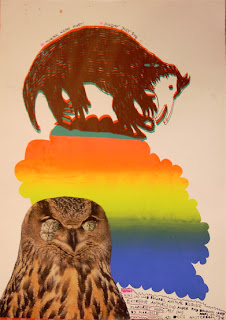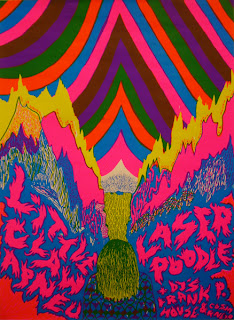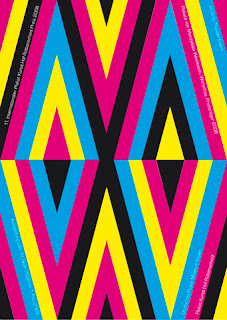Paper Fang
Sunday, 18 September 2011
Saturday, 10 September 2011
Brilliant Colour
From top; Baargeld, Moebius, unknown, unknown, Barry Miles and Milton Glaser, Eduardo Garcia Benito, Georges Giusti, Charles/Charley Harper, Keiichi Tanaami, unkown, Glaser again, and again, Otl Aicher, Pexy (twice), Shigeo Fukuda and Niklaus Troxler (twice).
Invisible Orders
I'm working on a new comic, a two page Klaus comic that may be published in an anthology in November. It's based on the idea, possibly a Talmudic idea, that if a person meets their double, or doppelganger, then they are not meeting with an evil portent but with God. It's also based on the quote below, which is John Berger, from a short essay based around the photographer Pentti Sammallahti;
"We live our daily lives in a constant exchange with a set of daily appearances surrounding us - often they are familiar, sometimes they are unexpected and new, but always they confirm us in our lives ... Yet it can happen, suddenly, unexpectedly, and most frequently in the half-light-of-glimpses, that we catch sight of another visible order which intersects with ours and has nothing to do with it ... We come upon a part of the visible which wasn't destined for us".
Tuesday, 6 September 2011
cat daft
On Saturday night, at about three in the morning, this cat appeared at my bedroom window. He seemed a bit pushy, a bit too keen to get in, clawing and butting the window; so I left him outside. When I came home on Sunday night my housemate had let him in. Now we can't get rid of him, and I don't really want to.
Friday, 2 September 2011
Notes on a preference for minimalism
I was looking at Jim Tyer images tonight when I saw this blog post on him by John Kricfalusi. He says;
"Tyer is a pure cartoonist. He does cartoons for the main reasons that cartoons should exist at all - to be wacky looking. They should be instantly funny to look at, then should do impossible things and should move in crazy imaginative ways. He covers all those 3 criteria naturally through sheer cartoonist's instinct. I think most cartoonists need those 3 attributes, yet so few have even one of them."
I'm never convinced by these sentiments about what cartoons, and cartoonists, should do, if only for the fact that most of my favourite cartoonists are very minimal, and entirely lacking in cartooning ... theatrics? ... hysterics? Anyway, I can't say that I like zany, wacky or crazy, and never have, even as a child (when busy strips like Calamity James made me quickly turn the page).
For example, when I look back at the various Beano comics it's the Torelli brothers' art (below) that I like the best, even though it has a banal cleanliness to it, a compact functionality. The same could be said for the other images below (by Loriot, Matt Groening, Suiho Tagawa and - I'm not sure), all of which I'm drawn to.
In fact, I find myself liking the most stationary and pedestrian comic-art imaginable. Sometimes I think I just like anything that looks like a toy.
When I was young I can remember drawing a lot, and what I drew was mainly taken from cheaply animated cartoons, advertising mascots, computer game characters and free plastic toys, from odd McDonalds meals and Kinder eggs. I had free plastic smurfs (and a smurf windmill) and Peanuts characters before I'd even seen the cartoons, and certainly before I'd read the comics. When I did see the comics they must have struck me as weirdly messy and anarchic, in comparison with the frozen faced Bartman, Chilly Willy and Snoopy that I'd been basing my own drawings on.
That's why that, although I disagree with John K's pronouncements on what makes good cartooning, I don't really trust my dismissal, my own preference, as I suspect that I'm disagreeing for the wrong reasons; that my own preferences are based on nothing more than my childhood consumption of cartoon-faced merchandising.
Subscribe to:
Comments (Atom)























































